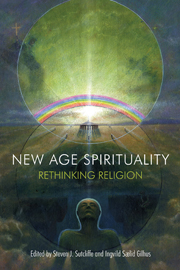Book contents
- Frontmatter
- Contents
- Introduction: “All mixed up” – thinking about religion in relation to New Age spiritualities
- Part I Rethinking New Age spiritualities
- Part II Comparing New Age beliefs and practices
- Part III Putting new spiritual practices to work
- Conclusion: New Age spiritualities – “good to think” in the study of religion
- Contributors
- Further reading
- Bibliography
- Index
Conclusion: New Age spiritualities – “good to think” in the study of religion
- Frontmatter
- Contents
- Introduction: “All mixed up” – thinking about religion in relation to New Age spiritualities
- Part I Rethinking New Age spiritualities
- Part II Comparing New Age beliefs and practices
- Part III Putting new spiritual practices to work
- Conclusion: New Age spiritualities – “good to think” in the study of religion
- Contributors
- Further reading
- Bibliography
- Index
Summary
In this book we have drawn on the data of new age spiritualities in order to try to rethink the general category of religion. Since the basic prototype of religion seems largely to have remained undisturbed when the terms “new religions” and “new religious movements” were introduced from the 1970s, especially in the context of undergraduate teaching programmes and everyday “common-sense” understandings, it is time to reassess and if possible to alter this situation. Two main questions have arisen over the course of this volume: in what ways do new age data ask questions of the dominant category of religion; and what is the analytical potential of a renewed general category of religion that includes new age phenomena among its integral components? In short, in what ways is new age “good to think” in the study of religion, to employ Levi-Strauss's apt phrase?
NEW AGE SPIRITUALITIES AND THE RETURN TO “ELEMENTARY FORMS”
When the academic study of religion was created in modern research universities in the later nineteenth century, the pioneers were preoccupied with finding basic motifs and components of “religion”. In the words of Emile Durkheim in 1912, the aim was to identify “the elementary forms of religious life”.
Several of the contributors to this volume look back to classical theories and engage more-or-less directly with some of the pioneers.
- Type
- Chapter
- Information
- New Age SpiritualityRethinking Religion, pp. 256 - 262Publisher: Acumen PublishingPrint publication year: 2013



